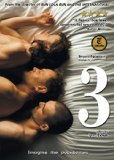| Reviews & Columns |
|
Reviews DVD TV on DVD Blu-ray 4K UHD International DVDs In Theaters Reviews by Studio Video Games Features Collector Series DVDs Easter Egg Database Interviews DVD Talk Radio Feature Articles Columns Anime Talk DVD Savant Horror DVDs The M.O.D. Squad Art House HD Talk Silent DVD
|
DVD Talk Forum |
|
|
| Resources |
|
DVD Price Search Customer Service #'s RCE Info Links |
|
Columns
|
|
|
3
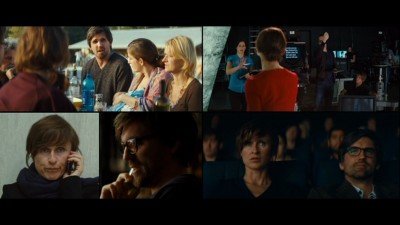
I suppose I would find German-based, internationally-active director Tom Tykwer (The International, and most famous--still, after many subsequent films--for 1999's Run Lola Run) more disappointing if I hadn't begun to think of him as truly nothing more (and, I should stress, nothing less) than a skilled and intelligent craftsperson who makes solidly enjoyable films but seems to have never developed a really distinctive voice of his own. Run Lola Run was pure sensation, and it was a thrill to watch, but it's much more fun than it is great; the closest Tykwer has ever come to greatness is 2002's Heaven, and much of the credit for that goes to his dutiful respect for the restraint and reflective qualities of that film's script, by the late Krysztof Kieslowski (Thre Colors). Tykwer's latest, the love-triangle romance 3, can be added to his growing filmography of modest, smart, entertaining films that neither insult one's intelligence nor leave as much of an impression as they could.
The film's struggling long-term, middle-aged monogamists, TV personality Hanna (Sophie Rois) and art-world contractor Simon (Sebastien Schipper) have been together for almost 20 years, and their endlessly pleasant/efficient routine together and their increasing awareness of the passage of time has gradually sapped almost all the erotic energy from their by now well-nigh sexless relationship. But some sort of quasi-metaphysical aura of change is in the air; Simon's mother (Angela Winkler, The Tin Drum, Danton) suddenly announces she has terminal pancreatic cancer and dies soon thereafter, while Simon himself is diagnosed almost simultaneously with treatable but discomfiting testicular cancer (the treatment is total removal of the diseased half of his scrotal contents). Meanwhile, Hanna is embarking on an affair with a sexy stem-cell researcher, Adam (Devid Striesow, Downfall), whom she met when she challenged him over a fine point on the subject of his research at an Ethics Board meeting. In marked contrast to Hanna and Simon's comfy, lived-in bourgeois-bohemian existence, Adam's life is affluent, active, but spartan; a divorced father, he avoids permanence and stays on the move, leaving his apartment unfurnished, tooling around on his motorbike, and compartmentalizing his paternal, professional, and sexual lives. Also distinguishing him from Hanna and Simon is his nonchalant pursuit of multiple sexual partners and resistance to anything deeper or more constraining on the romantic front than affection and sex.
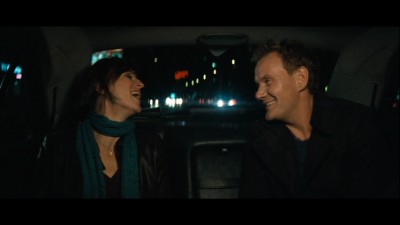
When, not long after his surgery, Simon meets Adam at a public pool, the two men have a casual, spontaneous, entirely unexpected (on Simon's part) locker-room encounter that is yet another increment, after his mother's passing and his own too-narrow evasion of mortality, in Simon's burgeoning self-awareness and expansion of consciousness, and he begins to fall in love with Adam. As does, separately, Hanna. And that stimulus, rather than pulling Simon and Hanna yet farther apart, seems to actually increase the real passion and love for one another that has lain dormant between them for too long. This situation--Hanna and Simon becoming closer than ever, to the point of getting married, even as they're both falling ever more deeply for Adam--comes to a head when Hanna discovers she's pregnant, guesses that Adam is the father, and races to tell him, bursting in on him at precisely the worst (or perhaps the most serendipitous) moment for Adam, Simon, and herself.
I don't think I could praise highly enough Tykwer's maturity and progressivism in all matters sexual and emotional. There isn't a trace of shame, panic, or overexplanation when it comes to the same-sex sexuality; just a rare, grown-up acceptance in the film's approach and some bemusement on Simon's part that this additional possibility was latent in him. And Tykwer's uninhibited, entirely accepting and unblinking depictions of both the opposite- and same-sex physical encounters are non-exploitatively but forthrightly erotic across the board, a welcome departure from business as usual for most movies (regardless of how "graphic" or "gay-friendly" they may be considered). 3 thus joins a rare and privileged group of films--John Schlesinger's Sunday, Bloody Sunday, Todd Haynes's Velvet Goldmine, and Bill Condon's Kinsey among them--that can fairly be called bisexually responsive, uninhibited, and truly sexually progressive. There's even a sort of symbolic parallelism between Adam's human race-advancing stem cell work and the evolutionary possibilities contained within this threesome's foray into unfamiliar and (still, regrettably) socially contested territory.
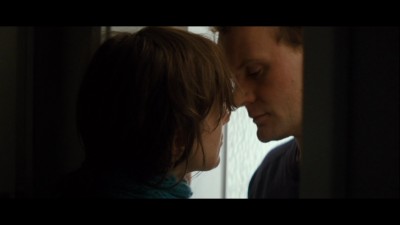
Which brings us to two of 3's biggest problems: its glibness of style and content, and its narrowness of scope when it comes to matters other than the sexual and emotional (and it's too idealistic and/or naive to see that those parts of life can never exist in a vacuum). That aforementioned parallelism, for all its intelligent encouragement and hopefulness, is executed in a skimmed-over way; it's too easy and shallow, and so are the film's other symbolic conceits (in visions, dream sequences, etc.) Tykwer has never quite found a way to reconcile his obvious love of the fancy/"unusual" shot or editing fillip, which was aptly worn on the sleeve in Run Lola Run, with his later interest in deeper and heavier material, and so his post-Lola films tend to feel compromised, watered down. The way this manifests in 3 is with a hurried-feeling professionalism and over-briskness brought on by expensive-looking, symmetrical, well-color-coordinated, but otherwise uninteresting shots as well as over-fast/overdone editing. Some rather important moments float before us in a laterally-overlapping "montage" of screens-within-the-screen that resembles nothing so much as multiple windows open on your internet browser and saps them of their weight and significance, and far too many of the film's moments come off quite a bit more "cool" and slick (read: trivializing) than they need to be.
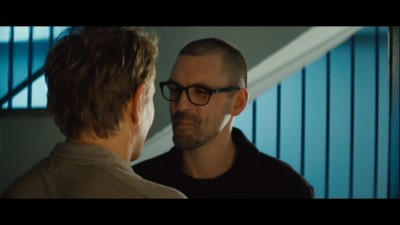
Then, too, there is the issue of the tiny, glamorous milieu in which Tykwer has set the film. The occupations of all three of our successful, well-educated, well-off protagonists place them firmly within the confines of what used to be (before the current never-ending financial crisis made such thinking look whimsical, if not gauche) optimistically called "the rising creative class." Even in the best of worlds, though, the circles in which Hanna, Simon, and Adam move would be a) not at all representative of or relatable for most people, and b) more likely by far to facilitate the all-too-rare open-mindedness and lack of prejudice demonstrated by the characters. The insularity of its world makes the film feel shut off, irrelevant to those of us who aren't salaried intellectuals, scientists, designers, etc.; it's an unlikely fantasy of progress that would much more often face so many more obstacles than Tykwer acknowledges. Setting the film's situation in a more common class (in which all of its depicted fluidity of desire and needs/longing beyond the conventional are undoubtedly every bit as present, if usually more repressed, embattled, and/or surreptitious) would have made for something less affirmative, perhaps, but also something more complex and substantial.
I've come to strongly dislike and avoid the word "pretentious" because its overuse and abuse have rendered it virtually meaningless, but the disconnects and shortfalls between the big, important ideas in 3 and the breezily unfocused way in which they too frequently play out would actually make the word as I understand it legitimately applicable for once. That's a shame, because it's a film with so many wonderful things going on in its head and in its heart (not to mention regions further south)--things that would have been more encouraging had they been brought off with more focus, clarity, and depth. As it stands, the film is still well worth a look; its bothersome superficiality isn't enough to make it entirely uninteresting, and it's not at all an actually unpleasant experience. It's just too forgettable to get worked up about, and one hopes that Tykwer or someone else will see fit in future to give the film's long-overdue humane, forward-thinking, and grown-up attitudes toward its romantic and sexual scenarios the kind of powerful, incisive, and more widely relevant treatment they deserve.
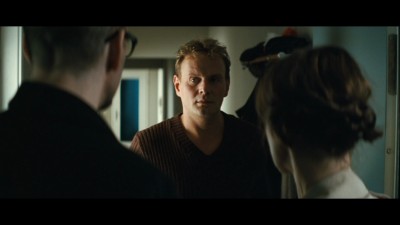
THE DVD:
For a standard-definition release, this transfer (anamorphic, at the original theatrical aspect ratio of 2.35:1) is remarkably fine. (Depending on how involved the director was in the release, this may be attributable to Tykwer's own technical fastidiousness, which for all the film's weak spots is beyond question.) Everything looks clear and vivid, with virtually no pixellation, aliasing, or other compression artifacts, yet with a nice celluloid texture retained, making for a theater-like visual experience.
Sound:The Dolby Digital 2.0 soundtrack is perfectly clear and dimensional, conveying very well all the nuances of the film's music/score soundtrack as well as sound editor Frank Kruse's layers of sound design.
Extras:Nothing save for the film's theatrical trailer and a handful of other previews for movies available on DVD from Strand Releasing.
FINAL THOUGHTS:Tom Tykwer's 3 is a frustrating movie, bravely taking on important ideas about love, sex, family, and society, but then falling well short of being anything like an important film. Its depiction of a love triangle that very healthily challenges complacent assumptions about love and sex is encouraging and pleasant, but somehow also toothless and airless--a utopian diagram that lacks sufficient complexity and focus in either the story or the way it's told to really provoke or exhilarate. There are films that fail because they're a mess, but then there are films like this one, which fail to realize their potential because they're too neat 'n tidy, too self-contained and facile to really get under your skin. Despite the eminent praiseworthiness of its political, social, and sexual sensibilities, 3 is watered-down and anodyne enough in its actual execution to only just warrant being Recommended.
|
| Popular Reviews |
| Sponsored Links |
|
|
| Sponsored Links |
|
|
| Release List | Reviews | Shop | Newsletter | Forum | DVD Giveaways | Blu-Ray | Advertise |
|
Copyright 2024 DVDTalk.com All Rights Reserved. Legal Info, Privacy Policy, Terms of Use,
Manage Preferences,
Your Privacy Choices | |||||||









